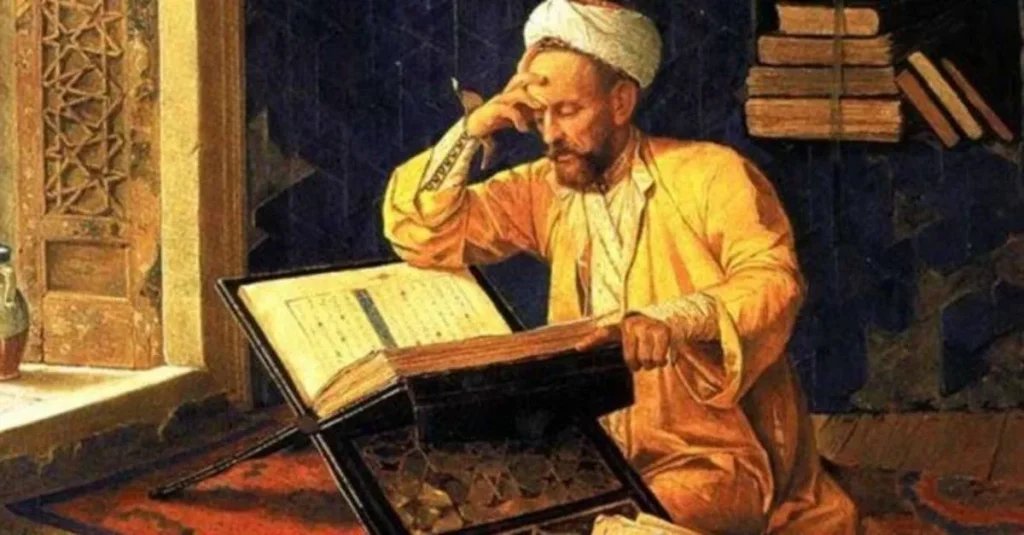
A of portrait of Imam Al-Ghazali
Literary Contributions of Imam Al-Ghazali
Imam Al-Ghazali (رحمه الله) made significant literary contributions in philosophy, theology, ethics, and spirituality [1]. His writings shaped Islamic thought.
He authored Ihya’ Ulum al-Din, a comprehensive work integrating ethics, Sharia, and spiritual guidance [2]. It influenced scholars for centuries.
Al-Ghazali also wrote Tahafut al-Falasifa, critiquing philosophical excesses. This work reconciled reason with revelation [1].
His books were known for clarity, logic, and accessibility. Complex ideas were explained in simple, concise language [3].
He produced treatises on ethics, Sufism, and jurisprudence. Each work emphasized moral development alongside knowledge [2].
Al-Ghazali’s literary style balanced depth and readability. Scholars and students benefited from both intellectual rigor and spiritual insight [1].
He also contributed to educational literature. His works guided teachers and students in curriculum design and moral instruction [3].
In essence, Al-Ghazali’s literary contributions bridged intellect, morality, and spirituality, leaving a lasting legacy in Islamic scholarship [2].
References:
- Al-Ghazali, Ihya’ Ulum al-Din, 11th century.
- Fakhry, Majid, A History of Islamic Philosophy, Columbia University Press, 2004.
- Hourani, George, Islamic Thought in the Classical Age, Cambridge University Press, 1983.
His Diverse Literary Works
Imam Al-Ghazali (رحمه الله) produced a wide range of literary works spanning theology, philosophy, ethics, and Sufism [1].
His works included Ihya’ Ulum al-Din, Tahafut al-Falasifa, and numerous treatises on jurisprudence, morality, and spirituality [2].
Al-Ghazali wrote commentaries on the Qur’an and Hadith. He emphasized ethical guidance alongside scholarly analysis [1].
He also composed works addressing philosophy, reconciling reason with revelation, and critiquing extreme rationalism [3].
His ethical and spiritual texts guided daily life, promoting sincerity, humility, and moral discipline [2].
Al-Ghazali’s literary diversity reflects his interdisciplinary approach. Each work addressed specific needs of scholars, leaders, or ordinary Muslims [1].
He maintained clarity and accessibility in his writings. Complex ideas were communicated with simplicity, ensuring broader understanding [3].
In essence, his diverse literary output enriched Islamic intellectual tradition. Al-Ghazali influenced generations of scholars and spiritual seekers [2].
References:
- Al-Ghazali, Ihya’ Ulum al-Din, 11th century.
- Fakhry, Majid, A History of Islamic Philosophy, Columbia University Press, 2004.
- Hourani, George, Islamic Thought in the Classical Age, Cambridge University Press, 1983.
New Perspectives on Islamic Philosophy
Imam Al-Ghazali (رحمه الله) offered new perspectives on Islamic philosophy. He balanced reason, revelation, and spirituality [1].
He critiqued philosophers who relied solely on rationalism. Al-Ghazali emphasized that reason must align with divine guidance [2].
His work Tahafut al-Falasifa challenged the overuse of logic in understanding metaphysical truths [1]. Revelation provides boundaries for philosophical inquiry.
Al-Ghazali also integrated Sufism into philosophical discourse. Ethics, morality, and inner purification became essential to understanding truth [3].
He argued that knowledge without spiritual and moral grounding is incomplete. Intellectual achievement must accompany ethical refinement [2].
His approach influenced subsequent scholars. Later Islamic philosophers adopted his balanced methodology, respecting both reason and divine law [1].
Al-Ghazali’s new perspectives bridged disciplines. Theology, philosophy, and mysticism interacted harmoniously under his guidance [3].
In essence, he reshaped Islamic philosophical thought. Al-Ghazali’s ideas remain influential in reconciling intellect, ethics, and spirituality [2].
References:
- Imam Al-Ghazali, Tahafut al-Falasifa, 11th century.
- Fakhry, Majid, A History of Islamic Philosophy, Columbia University Press, 2004.
- Hourani, George, Islamic Thought in the Classical Age, Cambridge University Press, 1983.
Impact on Muslim Scholars and Thinkers
Imam Al-Ghazali (رحمه الله) profoundly influenced Muslim scholars and thinkers across disciplines [1]. His works shaped generations.
He bridged the gap between philosophy, theology, and mysticism. Scholars found guidance in both intellect and spirituality [2].
Al-Ghazali emphasized ethics in scholarship. Knowledge without moral grounding was considered incomplete [1].
His writings inspired jurists, theologians, and philosophers. They integrated his insights into teaching and legal interpretation [3].
Al-Ghazali’s approach influenced educational systems. Students learned to balance reason, faith, and personal ethics [2].
He also impacted Sufi thinkers. Spiritual reflection and inner purification became central in intellectual pursuits [1].
His legacy extended beyond his era. Later Muslim scholars referenced his works in philosophy, theology, and ethics [3].
In essence, Al-Ghazali molded the intellectual and moral framework of Islamic scholarship, leaving an enduring influence on Muslim thinkers [2].
References:
- Imam Al-Ghazali, Ihya’ Ulum al-Din, 11th century.
- Fakhry, Majid, A History of Islamic Philosophy, Columbia University Press, 2004.
- Hourani, George, Islamic Thought in the Classical Age, Cambridge University Press, 1983.
Legacy and Influence After His Death
Imam Al-Ghazali (رحمه الله) left an enduring legacy after his death in 1111 CE [1]. Scholars continued studying his works.
His writings shaped Islamic education. Ihya’ Ulum al-Din remained a central text in madrasas and scholarly circles [2].
Philosophers and theologians integrated his ideas. Al-Ghazali influenced debates on reason, ethics, and spiritual understanding [1].
Sufi orders adopted his teachings. Inner purification and moral discipline became core aspects of spiritual training [3].
His critiques of philosophers guided subsequent intellectual discourse. Later thinkers balanced rational inquiry with religious principles [2].
Al-Ghazali’s influence crossed regions. From the Middle East to South Asia, scholars referenced his works for guidance [1].
Even centuries later, his approach to combining knowledge, ethics, and spirituality inspired Muslim thinkers and educators [3].
In essence, Al-Ghazali’s death did not end his impact. His teachings continue to shape Islamic scholarship, spirituality, and moral thought [2].
References:
- Al-Ghazali, Deliverance from Error (Al-Munqidh min al-Dalal), 11th century.
- Fakhry, Majid, A History of Islamic Philosophy, Columbia University Press, 2004.
- Hourani, George, Islamic Thought in the Classical Age, Cambridge University Press, 1983.
Imam Al-Ghazali’s Lasting Impact on Islam
Imam Al-Ghazali (رحمه الله) profoundly shaped Islamic thought, spirituality, and education long after his death [1].
His works continue to guide scholars, theologians, and Sufi practitioners in moral, ethical, and spiritual matters [2].
Al-Ghazali emphasized integrating reason, revelation, and ethical practice. This approach influenced jurisprudence and theological studies [1].
His teachings in Ihya’ Ulum al-Din remain central in Islamic education. Students learn ethics, spirituality, and religious duties [3].
Sufi orders adopted his spiritual methods. Inner purification and moral reflection became core aspects of Islamic mysticism [2].
Philosophers and scholars referenced his critiques of extreme rationalism. His balance of intellect and faith shaped Islamic philosophy [1].
Al-Ghazali’s literary contributions inspired writings in ethics, theology, philosophy, and spiritual guidance across generations [3].
In essence, Al-Ghazali’s impact endures. Islam continues to benefit from his integration of knowledge, piety, and practical ethics [2].
References:
- Al-Ghazali, Ihya’ Ulum al-Din, 11th century.
- Fakhry, Majid, A History of Islamic Philosophy, Columbia University Press, 2004.
- Hourani, George, Islamic Thought in the Classical Age, Cambridge University Press, 1983.






